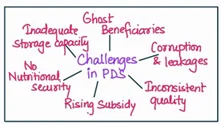Answer:
| Approach:
Introduction
Body
- Give a brief about problems faced in PDS.
- Enlist the reformative steps taken in PDS.
Conclusion
- Conclude stating that PDS has a huge role to play and the reforms are in the right direction, though there is more to be done.
|
Introduction:
The Public Distribution System (PDS) is an Indian food security system which evolved as a system for the distribution of food grains and other essential items to low-income households at affordable prices and management of emergency situations. It is the largest food security scheme globally and covers almost 60% of the Indian population.
Body:
The Centre incurs a huge subsidy bill for implementing PDS, but still India suffers from a serious proportion of hunger. Inaccurate identification of households, leakages in the delivery system, lack of adequate scientific storage facilities, financially inefficient, etc are some of the major concerns. This shows that the PDS system has failed on many counts to meet its objectives.

Reformative steps taken by the Government to make food grain distribution system more effective:
- End to end Computerization of Supply Chain Management: The procurement, storage, transport, and distribution of food grains is entirely computerized.
- Global Positioning System (GPS) and Radio-frequency identification (RFID) based real time vehicle tracking system for trucks used to transport subsidised food grains. It curbs the menace of diversion of subsidized food grains in black market.
- Aadhaar seeding: To weed out duplicate/in-eligible/bogus ration cards and to enable rightful targeting.
- Electronic Point of Sale (ePoS) devices are being installed at Fair Price Shops (FPSs). This helps tracking the distribution of food in a more systematic manner.
- Integrated Management of PDS (IM-PDS) & One Nation One Ration Card: Here all the ration cards will be connected to a centralised server and the beneficiary will be eligible to buy a monthly ration from any state. This will be useful for the migrant workers and their families.
Measures to make the PDS system more efficient and transparent can be:
- Decentralized procurement operations for states that have gained sufficient experience in this regard. This would help the Food Corporation of India (FCI) to focus on lagging states.
- Home delivery of food grains by developing a network like that of ASHA workers can help in increasing last-mile connectivity.
- Shanta Kumar Committee recommendations should be fully implemented.
- Increase investment in storage: Engagement of the private sector can help to modernize stocking and warehousing facilities.
- Increased public participation through social audits and participation of SHGs, Cooperatives, and NGOs will help in ensuring the transparency of the PDS system at ground level.
Conclusion:
The government initiatives for reform are in the right direction. But there are challenges and these must be looked into so that PDS continues to be the backbone of India’s food security system.
